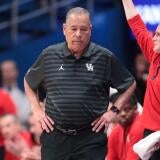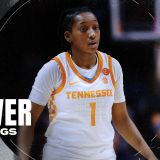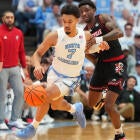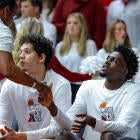NCAA early top 16 surprises: Kentucky too high, Gonzaga too low, Duke just right
Villanova was the overall No. 1 and Wisconsin is out of the top 16 the NCAA revealed

For the first time ever, the NCAA selection committee revealed its top 16 teams a month before the real selections are announced on March 12. This is something they have been considering for several years now, and finally came about in part because of a similar request from the coaches' association.
That group put together a committee to work with the NCAA on ways to improve the selection process and make it more transparent. That is also the group that recommended that the committee revisit the metrics is uses in the process. It was felt this release would help with the transparency because it would show what the committee was thinking a month out and would give the chair an opportunity to talk about the process publicly at a quieter time in the season than selection Sunday.
The full #BracketPreview!
— NCAA March Madness (@marchmadness) February 11, 2017
Is it a glimpse at this year's Sweet 16?? pic.twitter.com/TElTZy98WG
Each year at this time, the committee meets to go through an abbreviated, mock selection process so that the members, especially the new ones, can get used to the process, tools and data that are used in putting together the bracket. That mock selection process was modified some this year to put more emphasis on the top 16 since they were going to be announcing that.
What they gave us certainly had a few surprises:
Kentucky higher than expected, Duke just about right
Kentucky as a No. 3 seed was a bit surprising as well. The Wildcats have played a good schedule, but haven't been overly successful. The win over North Carolina is great, of course, and beating South Carolina at home is expected, but this is a team that lost at home to Kansas and UCLA, which is a No. 4 seed in the bracket, and at Tennessee. I don't think Florida should have been ahead of them, so that's a bigger surprise, but UK as a No. 3 is a bit high also.
Duke as a No. 4 is fine though. Keep in mind that this is a team that is just recently healthy and whole. Despite that, the Blue Devils have played a better schedule than the No. 5 seeds and have better wins. The win over UNC is a difference maker. They are not a No. 4 seed without that.
Undefeated Gonzaga the last No. 1 seed
Gonzaga coach Mark Few is one of the coaches at the forefront of the movement for more transparency. He may not like what he sees. His undefeated Bulldogs were placed fourth among the No. 1 seeds. I found this to be particularly surprising since the committee was much higher on Florida than they probably should have been, and that is one of Gonzaga's better wins.
They also beat Arizona, which is among in the top 16. Villanova, for example, has only one win against the teams revealed today. Gonzaga's overall schedule is not as strong as the other three, or really as strong as many of the teams on this list. Strength of schedule is a significant factor for the committee. If you are a Gonzaga fan, this should make you nervous. It is possible that the Bulldogs could win out and still not be a No. 1 seed.
Oregon a two, but UCLA a four
This one surprised me enough that I asked if perhaps the committee overlooked the Oregon-UCLA game from Thursday night because it was so late. Of course, they did include it. Once again, this is a strength of schedule matter. UCLA has a great win at Kentucky, but a relatively weak schedule overall.
The Bruins have just three top 50 wins and nine top 100 wins, the least of any team in the top 16 in either category. The Pac-12 is down and the Bruins' non-conference schedule ranks 241st, so this could be a problem for them a month from now also. It just goes to show that even power teams may need to test themselves outside their league.
Florida a No. 3, but no Wisconsin?
I have spent some of the last week beating up the voters for having the Badgers so high in the polls. They have a great record, but not a whole lot to back it up. Florida is kind of the same way, although their record is not as good. The Gators have a good strength of schedule, largely because they avoided playing many of the lower rated teams and because they had to play a handful of non-conference games at neutral sites instead of at home while their arena was under construction.
Florida beat Kentucky at home, which is slightly better than Wisconsin's best win, which came on the road at Minnesota. Both teams have a couple of other wins against teams much lower in the bracket. Wisconsin has not and will not get a team the caliber of Kentucky on its home floor, but the Badgers also have not lost to a team like Vanderbilt at home or any team at home. Wisconsin's worst loss was at Purdue.
I think this was a case of the committee being seduced by the numbers without having the time to really scrub the details. You need to go through the full process of putting an entire bracket together to do that well. I think you can make an argument for Florida to be a little ahead of Wisconsin, but those teams are a lot closer together than the committee indicated. In my bracket on Friday, Wisconsin was the last of my four seeds and Florida was only two teams back, with Purdue in between.
Final thoughts
The committee is only giving us 16 teams instead of 68 for a couple of reasons. First and foremost, they do not have time. The meeting to put the real bracket together in March is a grueling five days long. It is not realistic to ask them to go through that rigorous process more than once.
The other reason is that the committee does not want to be in the position of being predictive. To do a full bracket, they would need to assign the 32 automatic qualifiers. That is a no-win situation for them. No matter how they do that, people will complain and some will feel slighted. They can do a top 16 without having to worry about anyone being a conference champion.
So, you will have to just keep getting bubble information from the likes of me. The committee will not be weighing in on that until March.

















